Aashu Singh
Socratic Students: Teaching Language Models to Learn by Asking Questions
Dec 20, 2025Abstract:Large Language Models (LLMs) excel at static interactions, where they answer user queries by retrieving knowledge encoded in their parameters. However, in many real-world settings, such as educational tutoring or medical assistance, relevant information is not directly available and must be actively acquired through dynamic interactions. An interactive agent would recognize its own uncertainty, ask targeted questions, and retain new knowledge efficiently. Prior work has primarily explored effective ways for a teacher to instruct the student, where the teacher identifies student gaps and provides guidance. In this work, we shift the focus to the student and investigate effective strategies to actively query the teacher in seeking useful information. Across math and coding benchmarks, where baseline student models begin with near-zero performance, we show that student-led approaches consistently yield absolute Pass@k improvements of at least 0.5 over static baselines. To improve question quality, we train students using Direct Preference Optimization (DPO) with guidance from either self or stronger students. We find that this guided training enables smaller models to learn how to ask better questions, further enhancing learning efficiency.
Think Then Embed: Generative Context Improves Multimodal Embedding
Oct 06, 2025Abstract:There is a growing interest in Universal Multimodal Embeddings (UME), where models are required to generate task-specific representations. While recent studies show that Multimodal Large Language Models (MLLMs) perform well on such tasks, they treat MLLMs solely as encoders, overlooking their generative capacity. However, such an encoding paradigm becomes less effective as instructions become more complex and require compositional reasoning. Inspired by the proven effectiveness of chain-of-thought reasoning, we propose a general Think-Then-Embed (TTE) framework for UME, composed of a reasoner and an embedder. The reasoner MLLM first generates reasoning traces that explain complex queries, followed by an embedder that produces representations conditioned on both the original query and the intermediate reasoning. This explicit reasoning step enables more nuanced understanding of complex multimodal instructions. Our contributions are threefold. First, by leveraging a powerful MLLM reasoner, we achieve state-of-the-art performance on the MMEB-V2 benchmark, surpassing proprietary models trained on massive in-house datasets. Second, to reduce the dependency on large MLLM reasoners, we finetune a smaller MLLM reasoner using high-quality embedding-centric reasoning traces, achieving the best performance among open-source models with a 7% absolute gain over recently proposed models. Third, we investigate strategies for integrating the reasoner and embedder into a unified model for improved efficiency without sacrificing performance.
RESTRAIN: From Spurious Votes to Signals -- Self-Driven RL with Self-Penalization
Oct 02, 2025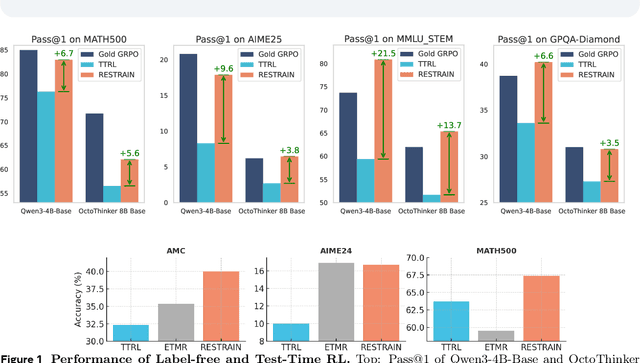
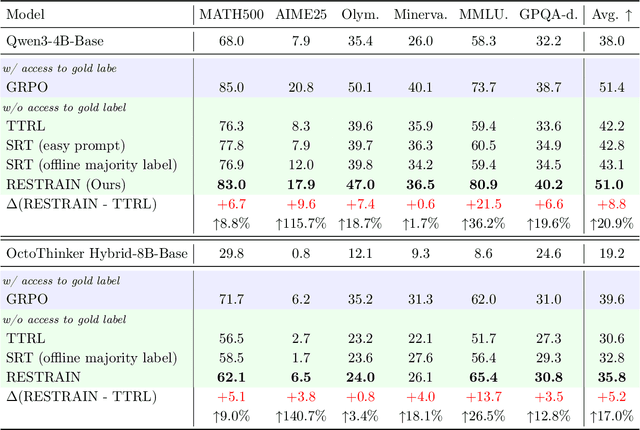

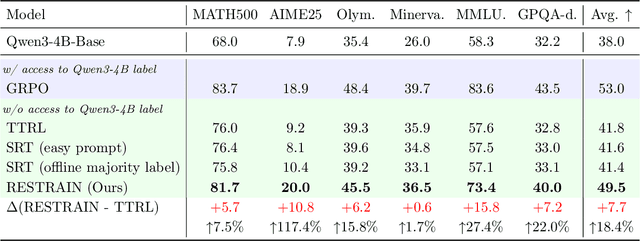
Abstract:Reinforcement learning with human-annotated data has boosted chain-of-thought reasoning in large reasoning models, but these gains come at high costs in labeled data while faltering on harder tasks. A natural next step is experience-driven learning, where models improve without curated labels by adapting to unlabeled data. We introduce RESTRAIN (REinforcement learning with Self-restraint), a self-penalizing RL framework that converts the absence of gold labels into a useful learning signal. Instead of overcommitting to spurious majority votes, RESTRAIN exploits signals from the model's entire answer distribution: penalizing overconfident rollouts and low-consistency examples while preserving promising reasoning chains. The self-penalization mechanism integrates seamlessly into policy optimization methods such as GRPO, enabling continual self-improvement without supervision. On challenging reasoning benchmarks, RESTRAIN delivers large gains using only unlabeled data. With Qwen3-4B-Base and OctoThinker Hybrid-8B-Base, it improves Pass@1 by up to +140.7 percent on AIME25, +36.2 percent on MMLU_STEM, and +19.6 percent on GPQA-Diamond, nearly matching gold-label training while using no gold labels. These results demonstrate that RESTRAIN establishes a scalable path toward stronger reasoning without gold labels.
Optimizing Recall or Relevance? A Multi-Task Multi-Head Approach for Item-to-Item Retrieval in Recommendation
Jun 06, 2025Abstract:The task of item-to-item (I2I) retrieval is to identify a set of relevant and highly engaging items based on a given trigger item. It is a crucial component in modern recommendation systems, where users' previously engaged items serve as trigger items to retrieve relevant content for future engagement. However, existing I2I retrieval models in industry are primarily built on co-engagement data and optimized using the recall measure, which overly emphasizes co-engagement patterns while failing to capture semantic relevance. This often leads to overfitting short-term co-engagement trends at the expense of long-term benefits such as discovering novel interests and promoting content diversity. To address this challenge, we propose MTMH, a Multi-Task and Multi-Head I2I retrieval model that achieves both high recall and semantic relevance. Our model consists of two key components: 1) a multi-task learning loss for formally optimizing the trade-off between recall and semantic relevance, and 2) a multi-head I2I retrieval architecture for retrieving both highly co-engaged and semantically relevant items. We evaluate MTMH using proprietary data from a commercial platform serving billions of users and demonstrate that it can improve recall by up to 14.4% and semantic relevance by up to 56.6% compared with prior state-of-the-art models. We also conduct live experiments to verify that MTMH can enhance both short-term consumption metrics and long-term user-experience-related metrics. Our work provides a principled approach for jointly optimizing I2I recall and semantic relevance, which has significant implications for improving the overall performance of recommendation systems.
Transfer between Modalities with MetaQueries
Apr 08, 2025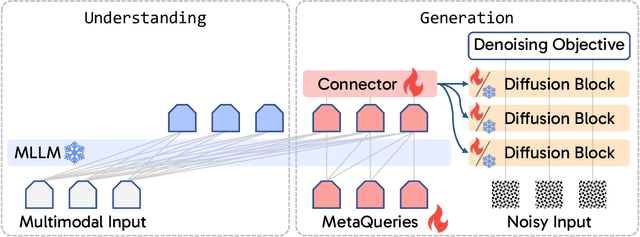


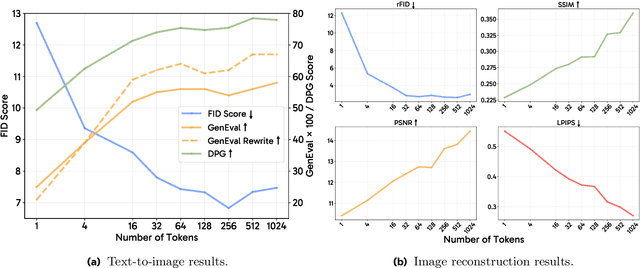
Abstract:Unified multimodal models aim to integrate understanding (text output) and generation (pixel output), but aligning these different modalities within a single architecture often demands complex training recipes and careful data balancing. We introduce MetaQueries, a set of learnable queries that act as an efficient interface between autoregressive multimodal LLMs (MLLMs) and diffusion models. MetaQueries connects the MLLM's latents to the diffusion decoder, enabling knowledge-augmented image generation by leveraging the MLLM's deep understanding and reasoning capabilities. Our method simplifies training, requiring only paired image-caption data and standard diffusion objectives. Notably, this transfer is effective even when the MLLM backbone remains frozen, thereby preserving its state-of-the-art multimodal understanding capabilities while achieving strong generative performance. Additionally, our method is flexible and can be easily instruction-tuned for advanced applications such as image editing and subject-driven generation.
CompCap: Improving Multimodal Large Language Models with Composite Captions
Dec 06, 2024



Abstract:How well can Multimodal Large Language Models (MLLMs) understand composite images? Composite images (CIs) are synthetic visuals created by merging multiple visual elements, such as charts, posters, or screenshots, rather than being captured directly by a camera. While CIs are prevalent in real-world applications, recent MLLM developments have primarily focused on interpreting natural images (NIs). Our research reveals that current MLLMs face significant challenges in accurately understanding CIs, often struggling to extract information or perform complex reasoning based on these images. We find that existing training data for CIs are mostly formatted for question-answer tasks (e.g., in datasets like ChartQA and ScienceQA), while high-quality image-caption datasets, critical for robust vision-language alignment, are only available for NIs. To bridge this gap, we introduce Composite Captions (CompCap), a flexible framework that leverages Large Language Models (LLMs) and automation tools to synthesize CIs with accurate and detailed captions. Using CompCap, we curate CompCap-118K, a dataset containing 118K image-caption pairs across six CI types. We validate the effectiveness of CompCap-118K by supervised fine-tuning MLLMs of three sizes: xGen-MM-inst.-4B and LLaVA-NeXT-Vicuna-7B/13B. Empirical results show that CompCap-118K significantly enhances MLLMs' understanding of CIs, yielding average gains of 1.7%, 2.0%, and 2.9% across eleven benchmarks, respectively.
 Add to Chrome
Add to Chrome Add to Firefox
Add to Firefox Add to Edge
Add to Edge